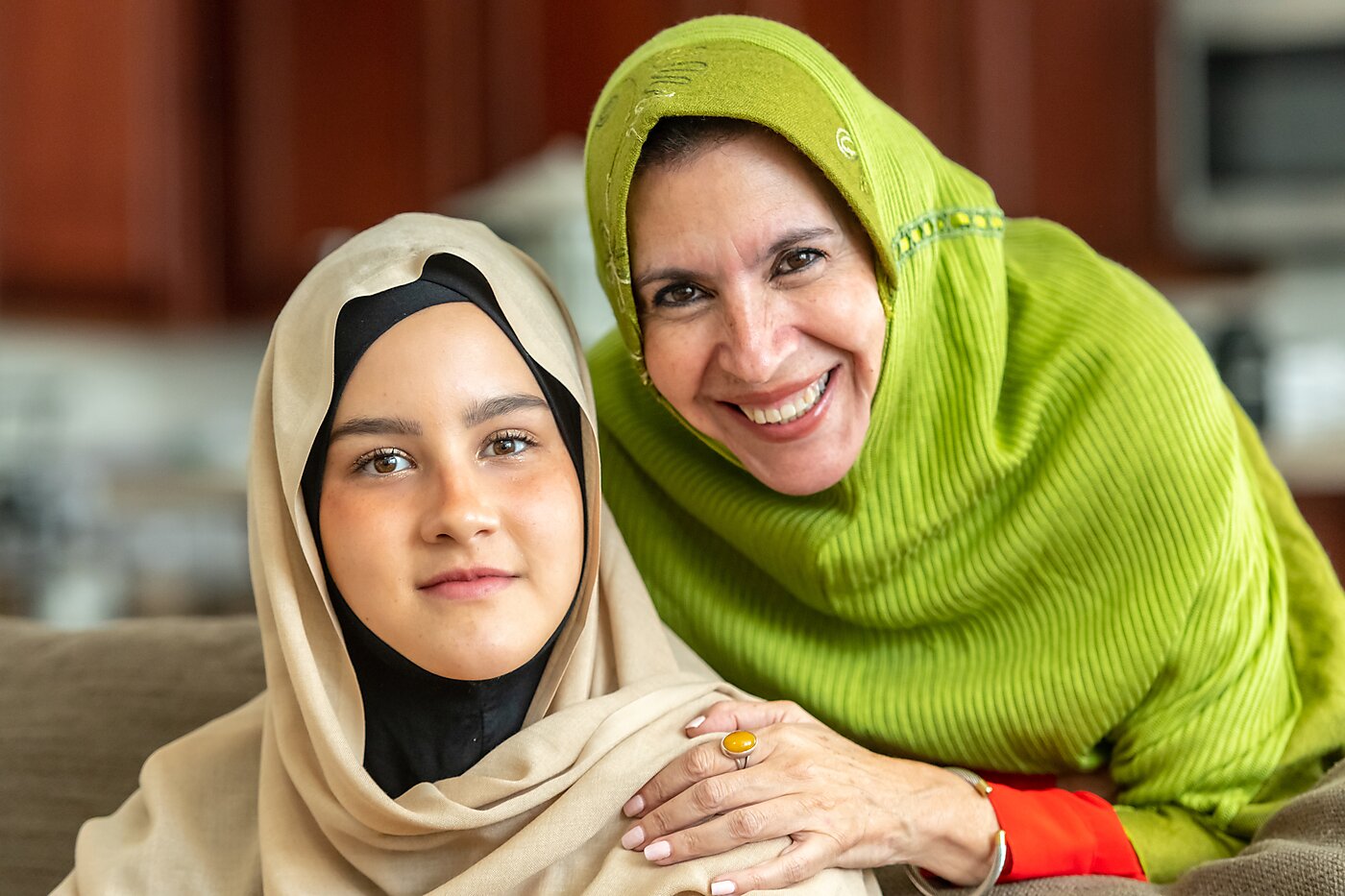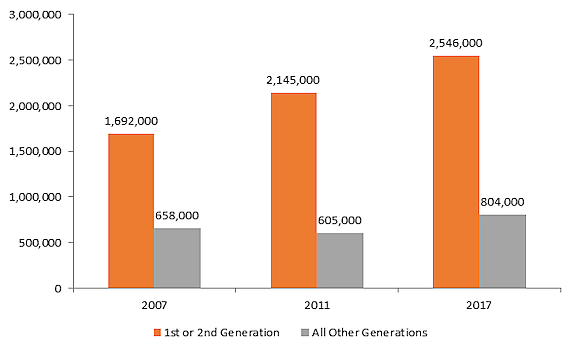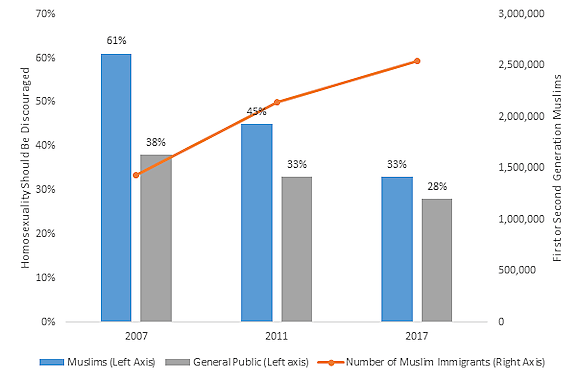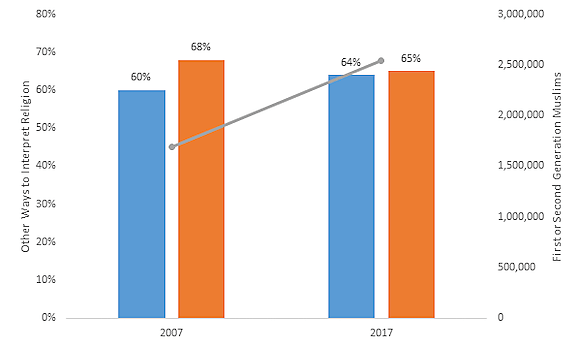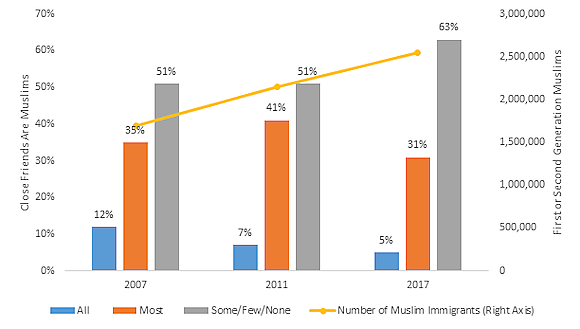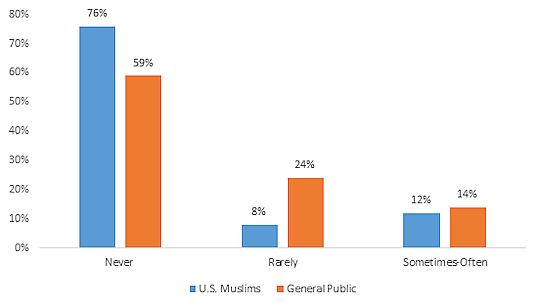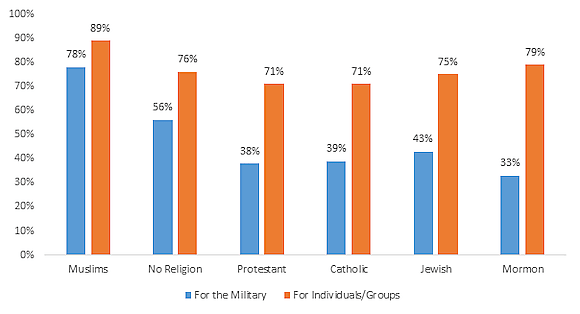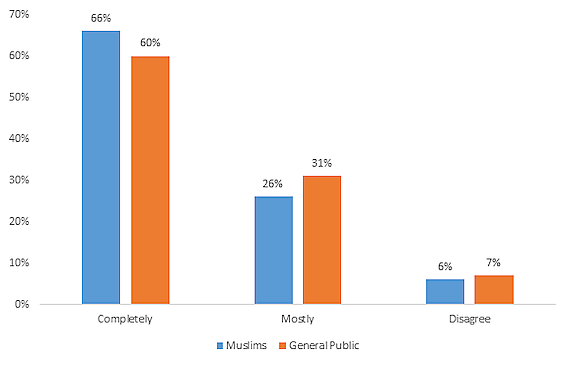Pew Research Center surveys of American Muslims have consistently shown a trend toward growing acceptance of mainstream American views, as I have written before. Pew’s latest poll reveals the same pattern as those in the past. Despite the most hostile political environment for Muslims in many decades, US Muslims continue to adopt the social views of other Americans.
Over the latest decade, the share of Muslim immigrants and their children has grown by 60 percent, from 1.7 million in 2007 to 2.6 million in 2017. The share of third-generation or more Muslims has fallen from 28 percent in 2007 to 24 percent in 2017, which indicates that Muslim immigrants are taking part in this shift toward more liberal views. Muslim immigration, which is large in relative terms, is not retarding Muslim assimilation.
Figure 1
U.S. Muslims By Generation in the United States
Source: Pew Research Center (2017). Pew has no surveys before 2007, but the best survey estimate for year 2000 placed the total Muslim population at 1.9 million (Smith (2002)).
Perhaps the most notable shift revealed in the Pew data is the change in Muslim American opinion toward homosexuality. The share that reports society should accept homosexuality has nearly doubled in 10 years from 27 percent in 2007 to 52 percent in 2017. As Figure 2 shows, 61 percent of US Muslims in 2007 supported “discouraging” homosexuality. Since then, this share has fallen almost in half, dropping from 61 percent to 33 percent.
As I have discussed before, 87 percent of Muslims in Pew polls in non-US countries oppose the toleration of homosexuality, which indicates a rapid change in views.
Figure 2
Pew Poll: Society Should Discourage Homosexuality (Percent Agree)
Source: Pew Research Center (2017).
Muslim Americans are simply not the fundamentalists that certain critics portray them to be. Pew found that almost two-thirds of Muslims stated a belief that there is “more than one true way to interpret the teachings of my religion.” This share has risen somewhat over the last decade, while the general public share has fallen slightly to the point where there is no statistical difference between the two groups on this issue.
Unfortunately, the most recent Pew survey did not repeat a question it asked in 2007 and 2011 about whether more than one religion can lead to eternal life, but as I reported before, the trends were moving in the liberal direction.
Figure 3
Pew Poll: There is more than one true way to interpret the teachings of my religion
Source: Pew Research Center (2017), Pew Research Center (2008)
This assimilation process is likely associated with the growing integration of Muslims into society. According to Pew, 95 percent of Muslims have non-Muslim friends, compared to 88 percent in 2007 (Figure 4). Moreover, there is now a large majority that says that most of their friends are non-Muslim—up 12 percentage points since 2007.
Figure 4
Pew Poll: How many of your close friends are Muslim?
Source: Pew Research Center (2017).
The most important question for many people, however, is their support for intentional violence against civilians—or terrorism. In past polls, Pew asked a different question about support for violence against civilians in defense of Islam. In this poll, they asked a more general question to allow for comparison between Muslim and non-Muslim responses. It reveals that three-quarters of Muslim Americans think it is never permissible to target and kill civilians for a political, social, or religious cause—17 percentage points higher than the general public (Figure 5). Muslims and the general public were roughly equal in their support for such violence “sometimes” or “often.”
Figure 5
Pew Poll (2017): Can targeting and killing civilians for a political, social, or religious cause be justified?
Source: Pew Research Center (2017)
This poll confirms the findings of a 2011 poll by Gallup, which asked two very similar questions—one was whether it can be justified for “an individual person or a small group of persons to target and kill civilians” and the other “for the military.” US Muslims were again by far the most opposed to such violence in either scenario. The results in the Pew poll are most similar to the Gallup results for the military scenario. This could indicate that Muslims and the general public were thinking of that scenario, or it could be that Muslims are assimilating Americans’ more permissive attitudes to civilian killings.
Figure 6
Gallup 2011 Poll: Targeting and killing civilians is never justified
Source: Gallup (2011)
One reason why Muslim Americans are less likely to support violence against civilians is because Muslims worldwide are the most likely victims of terrorism and misguided military interventions. For this reason, they are much more resistant to the idea of exceptions to the normal moral impulse against this type of killing. A substantial portion of the US Muslim population were refugees and personally targeted for persecution and violence. More than 300,000 Muslims have entered as refugees since 2002, when US interventions in the Middle East, Africa, and Asia led to, as my colleagues’ recent paper explains, a rise in civilian deaths and more terrorist activity.
This could imply to some that Muslims are less patriotic since people sometimes wrongly conflate patriotism with support for government policies. My colleague Alex Nowrasteh calls this phenomenon “patriotic correctness.” But Muslim Americans apparently can separate government policies and their devotion to their country.
They are even more proud to be Americans than the general public—66 percent “completely agree” with the statement “I am proud to be an American” compared to 60 percent of the general public. Only 6 percent disagree compared to 7 percent of the general public. Muslim Americans are patriotic, just not patriotically correct.
Figure 7
Pew Poll: Do you agree with the statement: “I am proud to be an American”?
Source: Pew Research Center (2017)
Whenever I have written about Muslim polling, some people tell me that we cannot believe Muslims because they have a religious concept called “Taqiyya,” which compels them to lie. First of all, Taqiyya is mainly a Shia Muslim concept—Shias account for just 15 percent of US Muslims—and it justifies lying only “where there is overwhelming danger of loss of life or property and where no danger to religion would occur thereby.” Moreover, the tradition of justified lying in both Sunni and Shia Islam states that there is no obligation to lie even in the face of persecution. Like Christians, Muslims also celebrate martyrs who refused to recant under threat.
Moreover, some Jewish and Christian traditions both occasionally celebrate noble acts of deception—for example, the Egyptian midwives protecting Jewish children, Rahab protecting the Israeli spies at Jericho, and Elisha protecting Israel from invasion. Last month, Muslims and Christians collaboratively used this defensive use of deception to allow Filipino Christians to escape Islamic militants.
Regardless, the thoroughly unfalsifiable theory that Muslims are lying to pollsters cannot explain the facts. For example, if the “right answer” on homosexuality is obvious, why are their deceptive answers not “better” than other Americans? This theory also fails to explain why they have suddenly become more willing to lie today than 10 years ago and why they are less likely to “lie” to Pew and Gallup researchers in the United States than anywhere else in the world.
The Taqiyya excuse to dismiss valid polling on Muslims appears more like intellectual laziness or simply bigotry than a serious social science theory. Throughout history, people pushed similar theories about lying and untrustworthy Jews, perhaps most famously Protestant leader Martin Luther. It is hardly surprising that the same thing happens today with a similarly small minority in the United States, but it’s just as wrong.
